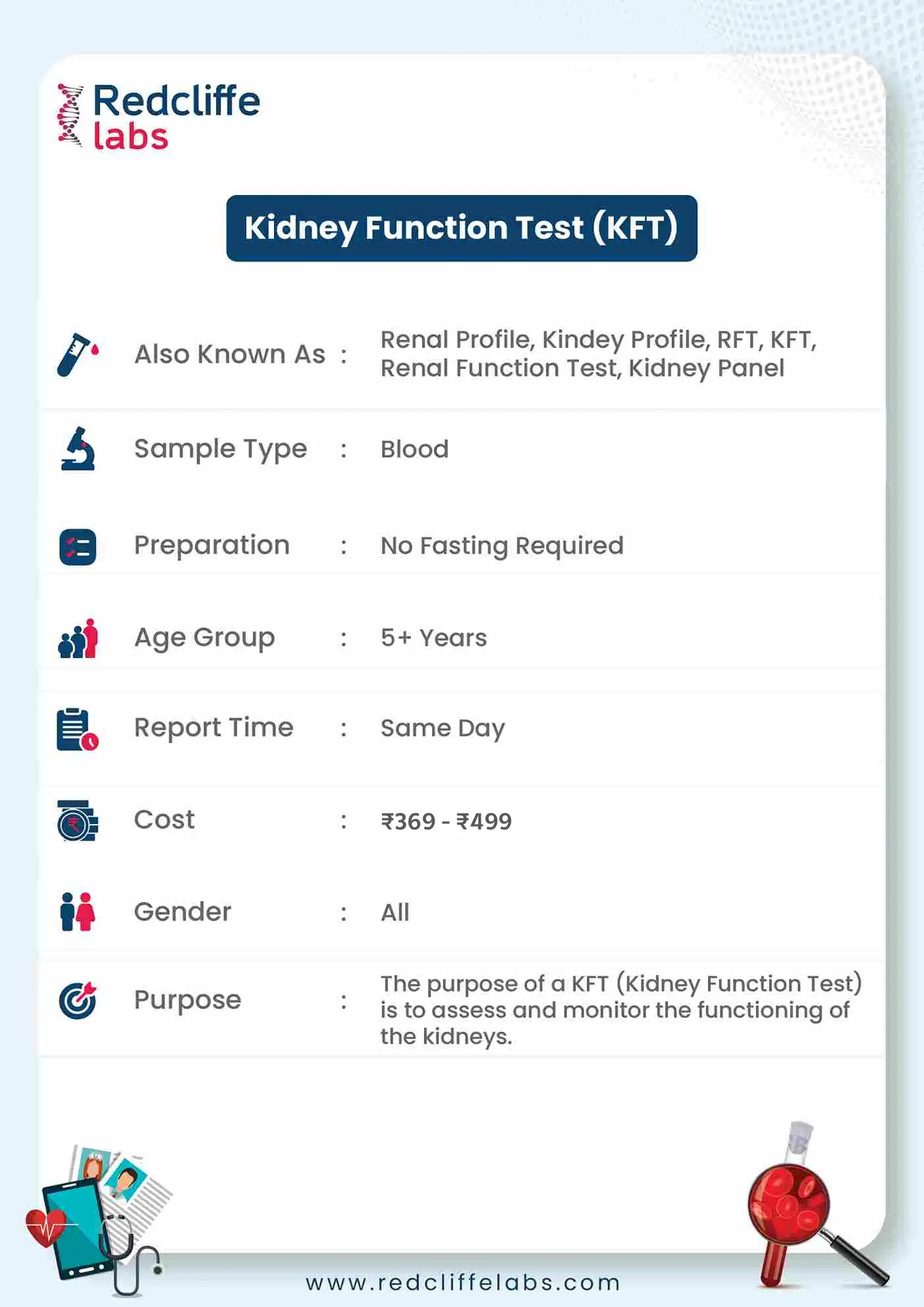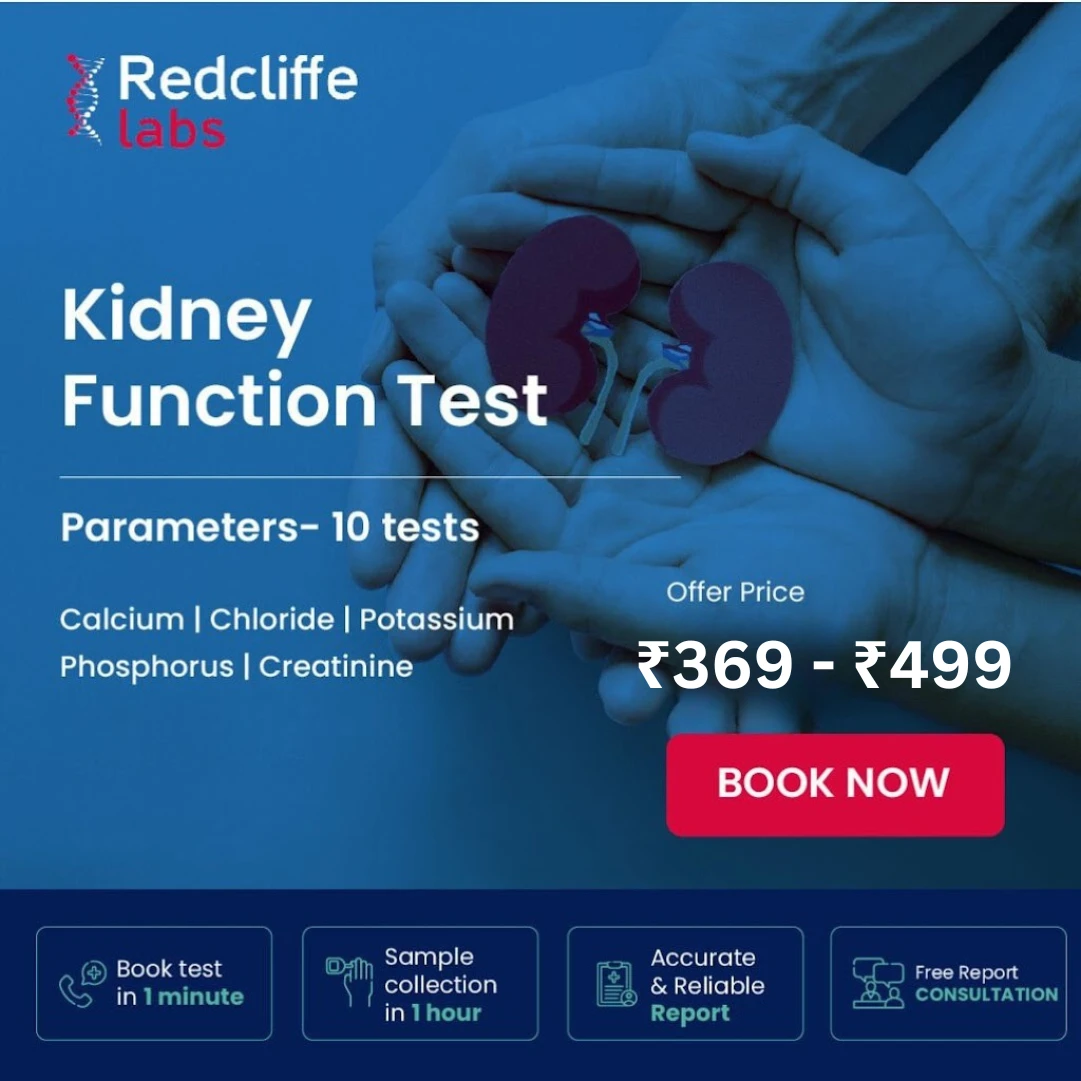KFT assesses kidney health by measuring blood levels...Read more
Blood
Unlock special
discount on
this package
Login to Unlock 🔓
Also Known As
Renal Profile, Kindey Profile, RFT, KFT, Renal Function Test, Kidney Panel, RFT Testtest Instructions
NABL Accredited lab*

Booking Benefits Unlocked Worth FREE 799

Report Consultation

Diet Plan
*Available once your report is generated.
At Redcliffe Labs, we have a single goal: to give India its right to quality diagnostics.
Customers served
Tests Processed Everyday
Cities
Collection Centres
World Class In-house Labs
Home Collection Experts
12 Test Parameters
Kidney Function Test (KFT)
12 PARAMETERS INCLUDED
12 PARAMETERS INCLUDED
- Blood Urea
- BUN
- BUN/Creatinine Ratio
- Calcium
- Chloride
- Creatinine
- eGFR
- Phosphorus
- Potassium
- Sodium
- Urea/Creatinine Ratio
- Uric Acid
Helps you know your test better
Who all are eligible for this test?
- A kidney function test is a simple test that uses blood or urine samples to help analyze the problems in the kidneys and is eligible for:
- Patients with hypertension
- People experiencing problems related to Urinary Tract Infections (UTIs), autoimmune problems or genetic renal problems like Polycystic Kidney Disease
- KFT tests are recommended to patients experiencing problems related to painful or frequent urination, hematuria etc.
Why take KFT test ?
- The purpose of kidney function test is to perform routine health checkups
- KFT test is also done during pregnancy to check for any uterine or reproductive health problems
- Signs or symptoms associated with kidney problems
- KFT is also done to examine or track the progress of the treatment
What are the benefits of this test?
- Kidney function test helps in screening the presence of blood and protein in the urine
- KFT helps in examining if creatinine is building up in the blood because high levels of creatinine mean a kidney issue
- Helps doctor diagnose causes related to unexplained high blood pressure
- Helps doctor examine the underlying cause of obesity
- Reduces risks of kidney damage due to advanced age, cigarette smoking, etc.
Top Booked Health Checkup Packages
Reports in 12 hours
|Parameters 94
Reports in 12 hours
|Parameters 89
Reports in 12 hours
|Parameters 96
Reports in 12 hours
|Parameters 96
Reports in 12 hours
|Parameters 90
Helps you know your test better
Q. How do I know if I am suffering from a kidney disorder?
Q. What are the key causes of kidney disease?
Q. How can I prevent myself from kidney disease?
Q. What foods are good for kidney health?
Verified by Medical Expert

WRITTEN BY
Sheena Mehta

MEDICALLY REVIEWED BY
Dr. Pradeep Lodha
Table of Content
Introduction to Kidney Function/Renal Function (KFT) Test
Kidney Blood Test, also known as eGFR (Estimated Glomerular Filtration Rate), is a thorough analysis of Kidney Function. The report of the test defines how efficiently the kidneys are performing waste detoxification. It is possible to analyze kidney function by measuring eGFR through blood tests. eGFR is a numeric value that can be gained by measuring the creatinine levels in the blood. The acceptable values of creatinine might vary depending on age and sex.
For a Kidney Function Test, you might be required to provide your blood sample, 24 hrs urine sample, or both samples.
With Redcliffe Labs, it's possible to understand smart test reports with ease. Still, if you need help analyzing the reports, you can avail yourself of free doctor consultations.
Test Details in Brief
| Also Known As | Renal Function Test, RFT Test, Kidney Panel, Kidney Profile |
| Purpose | The purpose of a KFT (Kidney Function Test) is to assess and monitor the functioning of the kidneys. |
| Fasting | No Fasting Required |
| Get Reports Within | Within 12 hours |
| KFT Test Cost | INR 399 |

Purpose of the Kidney Function Test
The purpose of the KFT test is to find out the kidney diseases. The test is used to diagnose, screen, and monitor-
- Diagnosis- The KFT test helps identify the cause of signs or symptoms. If you have symptoms related to kidney issues, your doctor may recommend it.
- Screening- This test is useful for detecting problems early. It helps to detect disease before symptoms appear. If you are at higher risk of developing kidney disease, your doctor may advise you to take a KFT test to identify the issues earlier.
- Monitoring- Regular KFT testing helps identify whether the condition is improving or worse. The test is done after treatment for kidney disease.
- Evaluating Symptoms of Kidney Disease- If you are experiencing symptoms like swelling in your legs or face, fatigue, nausea, urinary changes, and high blood pressure, take a KFT test to determine whether this is due to kidney disease.
- Assessing the Effects of Medications - Certain medications, including painkillers, antibiotics, and chemotherapy, can be harmful to the kidneys. A KFT monitors kidney function during and after such treatments.
- Pre-Surgical Evaluation - Doctors often recommend a KFT before surgery or major procedures. This test helps ensure that the kidneys are functioning properly and can handle anesthesia and medications.
- Tracking Progress of Kidney Disease - For people with kidney disease, the KFT test helps track the progression of the disease and evaluate the effectiveness of treatment.
Why is the Kidney Function test important?
The Kidney Function Test (KFT) is important because the kidneys play a vital role in maintaining overall health. They filter waste products, support fluid balance, regulate electrolytes, and produce hormones that control blood pressure and help in red blood cell production. If the kidneys are not working properly, waste and fluids may build up in the body, potentially causing serious health complications.
Why a Kidney Function Test is essential:
- Early Detection of Kidney Problems- KFT helps detect kidney issues before symptoms appear. Most kidney diseases are silent in the early stages, so regular testing allows for early diagnosis and treatment, which can prevent further damage.
- Monitoring Chronic Conditions- People with diabetes, high blood pressure, or heart disease are at higher risk for kidney disease. A KFT helps with regular monitoring, allowing any changes in kidney function to be spotted and managed promptly.
- Checking the Effects of Medications- Some medications, especially painkillers, antibiotics, and chemotherapy drugs, can impact kidney function. KFTs help assess whether your kidneys are handling these medications safely.
- Pre-Surgery or Hospitalization Requirement- Doctors often recommend a KFT before major surgery or treatment procedures to ensure the kidneys are functioning well enough to handle anesthesia and medications.
- Evaluating Symptoms Like:-
- Swelling in hands, feet, or face
- Fatigue
- Frequent or painful urination
- Blood in urine
- High blood pressure. These can all be signs of kidney problems, and a KFT helps identify the root cause
What do your Kidneys do?
Kidneys are important organs that play a vital role in maintaining overall health. They perform several essential functions, including:
- Your Kidneys filter out the blood to remove waste and toxic products, excess salts, and toxins. These waste materials are excreted through urine.
- Produce hormones that help maintain blood pressure.
- Produce Erythropoietin that stimulates red blood cell production in the bone marrow.
- Produce calcitriol (Active Vitamin D) that helps in calcium absorption for strong bones.
Keep your kidneys healthy to maintain your overall health. Drink more and more water, eat a balanced diet, and avoid excessive salt, sugar, and alcohol to protect kidney function.
Why Do You Need a Kidney Function Test?
Some conditions, such as diabetes or high blood pressure (Hypertension), can affect kidney function. If you have these diseases, you should consult your doctor and take the KFT test to monitor your overall health.
You may also need the KFT blood test if you have symptoms of kidney problems-
- Blood in your pee
- Foamy urine
- Frequent urges to pee
- Peeing less than expected
- Problems starting to pee
- Body swelling
- Feeling very tired
- Nausea and vomiting
The test is recommended before major surgeries; doctors assess kidney function to ensure the body can handle anesthesia and post-surgical medications. However, if you have a history of kidney stones or urinary tract infections (UTIs), KFT can help monitor kidney health.
Who needs a Kidney Function Test?
Some people should take the KFT test as a routine test-
- Age over 60 years
- Obesity
- Smoking
- Chronic use of medications (such as NSAIDs)
- Chronic urinary tract infections (UTIs)
- Autoimmune diseases (e.g., lupus)
- If you have diabetes or high blood pressure
- Diabetes
- Heart disease
- Taking medications that can affect kidneys
- If you have a family history of kidney disease
- If you are over 60 years old
- If you have persistent swelling, fatigue, or changes in urination
It is important to get testing early to detect and prevent serious kidney damage and improve overall health.
Why is Kidney Function Test Necessary?
Kidney Function Tests (KFT) are the only way to stay healthy and stay away from severe health complications that are related to your kidneys. It is because there are no significant symptoms reflected by kidney diseases in the initial stages. So, it is always better to opt for a preventive Kidney Blood Test, get your kidneys diagnosed, and avail of the treatment at the earliest, in case the test reports reveal any complications.
Preventive kidney tests are a must for individuals with a family history of kidney disorders, someone with diabetes, and fluctuating blood pressure levels.
Based on the results of these tests, doctors can determine how well the kidneys are functioning and diagnose conditions that affect kidney function, such as kidney disease or kidney failure. Treatment for kidney problems may include lifestyle changes, medications, or, in severe cases, dialysis or a kidney transplant.
Preparation For a Kidney Function Test:
A Kidney Function Test is a health checkup that requires both a blood and urine test.
- For a blood test for kidney function, you do not need to fast.
- You need to inform your healthcare professional if you are taking certain medicines.
- Do not stress and keep yourself calm during the blood sample collection, as it can otherwise influence your test results.
- Take proper sleep the night before the test to ensure that all your hormones are in balance.
- Refrain from drinking or smoking for a specific period to eliminate the chances of errors in the test results.
- Follow all the instructions of your healthcare professional, before, during, and after the test.
The procedure of the Kidney Function Test
The KFT test is a routine blood test that requires fasting for 10-12 hours before taking the test.
During the test, you just have to follow the instructions of the phlebotomist.
- He will tie a band on the upper arm to enhance the blood flow in the vein in your arm.
- After that, he will clean the area with an antiseptic solution.
- Next, he will insert a needle or syringe and collect the blood in a vial or tube.
- Once the blood is collected, he will remove the needle and put cotton gauze or bandage over the puncture site to stop bleeding.
- The KFT blood test process will take only a few minutes.
- You might experience some soreness or bruising, but this will get normal sometime.
Symptoms You Require Kidney Function Test:
Poor kidney function, or kidney disease, can have various symptoms. In the early stages, there may be no noticeable symptoms at all. As kidney function continues to decline, however, a person may experience the following symptoms:
- Fatigue and weakness: As the kidneys become less efficient at filtering waste from the blood, toxins can build up in the body, leading to feelings of fatigue and weakness.
- Swelling: Poor kidney function can cause fluid buildup in the body, leading to swelling in the legs, ankles, feet, face, or hands.
- Shortness of breath: Excess bodily fluid can also cause shortness of breath and difficulty breathing.
- Urination changes: Kidney disease can cause changes in urine output, such as urinating more or less frequently, producing dark or foamy urine, or experiencing pain or difficulty during urination.
- Blood pressure changes: Poor kidney function can cause high or worsening hypertension.
- Nausea and vomiting: A buildup of waste products in the body can cause nausea and vomiting.
- Poor appetite: Kidney disease can lead to a loss of appetite and unintended weight loss.
- Itching and dry skin: Kidney disease can cause dry, itchy skin and increase the risk of skin infections.
- Cognitive impairment: In advanced stages, kidney disease can cause cognitive impairment, confusion, and difficulty concentrating.
If you are experiencing any of these symptoms or have concerns about kidney function, talk to a healthcare provider.

Common Causes Of Kidney Dysfunction:
Kidney Dysfunction may be because by multiple reasons. Some of the common causes are detailed below.
- Diabetes: Diabetes is one of the most common causes of kidney disease. High blood sugar levels can damage the small blood vessels in the kidneys, leading to kidney damage over time.
- High Blood Pressure: High blood pressure can also damage the small blood vessels in the kidneys and cause kidney disease.
- Glomerulonephritis: This is a group of diseases that cause inflammation in the glomeruli, which are tiny filters in the kidneys that remove waste and excess fluids from the blood.
- Polycystic Kidney Disease: This is an inherited condition where fluid-filled cysts develop in the kidneys, leading to kidney damage over time.
- Kidney Stones: Kidney stones can cause blockages in the urinary tract, leading to kidney damage if left untreated. So, getting a kidney function diagnosis is recommended if you suffer any discomfort.
- Urinary Tract Infections: Repeated or chronic urinary tract infections can lead to kidney damage if the infection spreads to the kidneys.
- Certain Medications: Some medications, such as nonsteroidal anti-inflammatory drugs (NSAIDs) and certain antibiotics, can cause kidney damage if taken in high doses or over a long time.
- Toxins: Exposure to certain toxins, such as heavy metals, solvents, and pesticides, can cause kidney damage over time.
It's important to note that kidney disease can develop slowly over time and may not cause any symptoms until it's in advanced stages. Suppose you have any risk factors for kidney disease, such as diabetes or high blood pressure. Regular checkups with a trusted diagnostic center like Redcliffe Labs to monitor your kidney function are essential in that case.,
Also, if preventive checks are taken for any existing health disorders like diabetes, it would not lead to severe health conditions like kidney disorders.
KFT Test Parameters:
- Blood Urea
- BUN
- BUN/Creatinine Ratio
- Calcium
- Chloride
- Creatinine
- eGFR
- Phosphorus
- Potassium
- Sodium
- Urea/Creatinine Ratio
- Uric Acid
Blood & Urine Tests For the Kidney:
The doctors recommend a few blood and urine tests for early detection of kidney disorders, as detailed below.
The Estimated Glomerular Filtration Rate measures how efficiently the kidneys work. The eGFR Blood Test is a numeric value of creatinine. The different creatinine values reflect the various stages of kidney disorders, and if the creatinine values are lower than 15, then it signifies kidney failure.
The BUN test is a kidney function blood test useful for measuring urea nitrogen (a waste product in the body after protein breakdown). It is yet another test defining the efficiency of kidney function.
This blood serum test is helpful in defining how efficiently your kidneys filter the blood. The higher serum creatinine blood test reflects poor kidney function.
The urine test is one of the first tests to diagnose kidney disorders. If there is a protein leak through your urine, it is a sign of poor functioning and damage to the kidneys.
- Comprehensive Kidney Function Test:
A Kidney Function Test at Redcliffe Labs is a combination of 12 tests, including Urea, Creatinine, Phosphorus, calcium, and other parameters necessary to check the condition of the kidneys.
If there are any severe complications detected in the Blood & Urine Kidney Tests, then the medical professionals might further recommend you for the Kidney Biopsy and the Kidney Ultrasound.
Health Risks of Not Seeking Kidney Tests:
You might have to face severe complications of not seeking a kidney diagnosis. Some of them include the following:
- High Fluid Retention:
The fluid retention due to kidney disorder might lead to swelling in the arms & legs. Also, in chronic cases, the fluid can be filled in the lungs leading to pulmonary edema.
- Hyperkalemia:
The sudden increase in potassium levels in the blood causes hyperkalemia, and it can be life-threatening if it is not addressed at the right time.
Improper blood filtration due to kidney failure often results in anemia and associated complications in the body.
- Heart Diseases:
For Chronic Kidney Diseases, the heart requires to pump the blood harder to push it to the kidneys; this can often lead to heart failure and other cardiovascular diseases.
What do the KFT Test results Indicate?
A Kidney Function Test (KFT) evaluates how well your kidneys work by measuring waste levels, electrolytes, and other key markers in the blood and urine. Here's what the results mean:
Creatinine
- Normal Range:.72 - 1.25 mg/dL
- High Creatinine- Indicates kidney damage, dehydration, or high protein intake.
- Low Creatinine- This could indicate muscle loss, malnutrition, or liver disease.
Glomerular Filtration Rate (GFR)
- Normal Range: >=90 mL/min/1.73m²
- GFR Below 60: May indicate chronic kidney disease (CKD).
- GFR Below 15: Suggests kidney failure, requiring dialysis or transplant.
Blood Urea Nitrogen (BUN)
- Normal Range: 7-18.7 mg/dL
- High BUN: Indicates kidney disease, dehydration, or high protein intake.
- Low BUN: This could mean malnutrition or liver dysfunction.
Blood Urea Level
- Normal Range: 19-44.1 mg/dL
- High Urea Suggests kidney dysfunction or dehydration.
- Low Urea: This may be due to low protein intake or liver disease.
Electrolyte Levels (Sodium, Potassium, Phosphorus, Calcium)
1. Sodium (136-145 mmol/L ):
- High – Dehydration, kidney disease, high salt intake.
- Low – Overhydration, kidney dysfunction.
2. Potassium (3.5-5.1 mEq/L):
- High – Kidney failure (can cause heart problems).
- Low – Seen in some kidney diseases.
3. Phosphorus (2.3-4.7 mg/dL):
- High – Late-stage CKD.
- Low – Malnutrition.
4. Calcium (8.4-10.2 mg/dL):
- Low – Common in CKD, increases bone weakness.
5. Chloride- (98 - 107 mmol/L )
When to See a Doctor?
- GFR below 60
- High creatinine and BUN levels
- Protein or blood in urine
- Swelling, fatigue, changes in urination
Early detection of kidney problems allows for better management and prevention of severe complications. If your results are abnormal, consult a doctor for further evaluation.
Is there any risk of kidney function blood test?
A kidney function blood test is a safe procedure with no or minimal risk. You might feel a slight pain or bruising at the needle site, but it goes away quickly.
- Bruising or swelling
- Pain or discomfort
- Dizziness
- Risk of infection
- Hematoma
- Risk of bleeding
- Lightheadedness
Common disease diagnosed with KFT Test.
Here are the conditions that can be diagnosed with the KFT test-
- Chronic Kidney Disease (CKD) - KFT helps detect CKD in its early stages, when symptoms are not yet noticeable. High creatinine or BUN levels may indicate kidney damage in patients with diabetes or hypertension.
- Acute Kidney Injury (AKI)- Sudden spikes in creatinine or urea can point to acute kidney injury, often caused by dehydration, infections, or medication toxicity.
- Glomerulonephritis - Inflammation of the glomeruli (kidney filters) can be detected through abnormal filtration markers and elevated protein or blood in the urine, which often accompanies KFT changes.
- Kidney Stones - The KFT test does not directly detect stones. High uric acid levels or changes in kidney filtration may indicate recurrent stone formation or impaired kidney function due to obstruction.
- Urinary Tract Obstruction - Obstruction in the urinary tract can cause waste buildup in the bloodstream. A KFT identifies such issues by showing increased levels of urea and creatinine.
- Polycystic Kidney Disease (PKD)- This is an inherited disorder. Individuals with a family history are at a higher risk of developing these kidney problems.
- Dehydration or Fluid Imbalance- Abnormal electrolyte levels (sodium, potassium) and urea concentration suggest dehydration or an imbalance in body fluids.
- Kidney Dysfunction Due to Diabetes or Hypertension- Uncontrolled diabetes or high blood pressure are causes of kidney damage.
Regular kidney testing is vital if you have conditions like hypertension, diabetes, or a family history of kidney disease.
What affects your kidney function test results?
Several factors may influence KFT test results. These may include lifestyle, medical conditions, and medications. Let's understand these factors-
- Lifestyle—Eating too many protein-rich foods, excessive salt, dehydration, and sugar can temporarily increase BUN (Blood urea nitrogen) and creatinine levels. Excessive alcohol consumption and smoking can also cause kidney damage over time.
- Medications & Supplements- Certain drugs and supplements can interfere with test results:
- Painkillers (NSAIDs like ibuprofen, aspirin, naproxen)
- Antibiotics (e.g., aminoglycosides, vancomycin)
- Diuretics (Water Pills)
- ACE inhibitors and ARBs
- Chemotherapy drugs
- Immunosuppressants
- Medical Conditions-
- Diabetes
- High Blood Pressure
- Kidney Disease
- Heart Disease
- Urinary Tract Infections (UTIs)
Complications of Untreated kidney issues
Kidney diseases, if left untreated, can lead to severe health complications. Here are some of the health complications include-
- Chronic Kidney Disease (CKD) Progression
- Anaemia
- High Blood Pressure (Hypertension)
- Heart Diseases
- Bone weakness
- Gout
- Cardiovascular conditions like high blood pressure, stroke or heart attack
- Nerve damage
- Fluid retention and swelling
- Increased risk of infections
- Gastrointestinal Issues
- Kidney failure (end-stage renal disease)
- Bone diseases
To prevent complications, get regular health checkups and maintain a healthy lifestyle. If you notice any abnormal symptoms, such as swelling, fatigue, or changes in urination, seek medical advice immediately.
What are the Advantages of a KFT Test?
A Kidney Function Test (KFT) helps assess how well your kidneys work by measuring key parameters in your blood and urine. Here are the main benefits:
- A Kidney Function Test (KFT) helps assess how well your kidneys work by measuring key parameters in your blood and urine. Here are the main benefits:
- A KFT helps identify kidney issues early and allows timely intervention.
- People with health issues like diabetes, high BP, or a family history of kidney damage are at a higher risk. Regular KFTs help detect early kidney damage and prevent complications.
- Certain medications, such as NSAIDs, antibiotics, and chemotherapy drugs, can harm the kidneys. A KFT helps doctors monitor kidney health and adjust medications accordingly.
- Dehydration can cause high creatinine and BUN levels, indicating kidney stress. A KFT helps determine whether the body has too much or too little fluid and electrolytes.
- Patients with hypertension, diabetes, or heart disease should undergo routine KFTs to track kidney health.
- KFT results and imaging tests can help detect kidney stones and assess kidney damage.
- Regular KFTs can detect hidden health issues and help maintain overall well-being.
How do you maintain a kidney-healthy lifestyle?
To improve your kidney function, maintain a healthy diet with regular exercise and health checkups. Follow the below tips-
- Stay Hydrated- Drink enough water to help flush out toxins and support kidney function.
- Maintain a Balanced Diet- Avoid processed foods, canned items, and excessive salt to prevent high blood pressure and fluid retention. Eat more fruits and vegetables to reduce inflammation and improve kidney function;
- Maintain a Healthy Weight- Obesity may increase your risk of kidney disease. Lose excess pounds through a healthy diet and regular exercise.
- Exercise Regularly—To maintain your blood pressure, weight, and blood sugar levels, Engage in 30 minutes of moderate exercise, such as walking or swimming.
- Quit Smoking & Limit Alcohol- Avoid smoking and alcohol as it may worsen kidney function.
- Manage Stress & Get Enough Sleep—Chronic stress can increase inflammation and blood pressure. Get 7-8 hours of quality sleep to support kidney function.
- Avoid Overuse of Painkillers & NSAIDs- Taking too much painkillers can harm kidney function.
- Regular Kidney Function Tests- Get your KFT test done regularly to monitor your kidney function.
What is the RFT Test Normal Range?
| RFT Test | Normal Values |
| Blood Urea | 19 - 44.1 mg/dL |
| Creatinine | 0.72 - 1.25 mg/dL |
| BUN | 6 - 20 mg/dL |
| BUN/Creatinine Ratio | 5.5 - 19.2 % |
| Uric Acid | 3.5 - 7.2 mg/dL |
| Calcium Serum | 8.4 - 10.2 mg/dL |
| Phosphorus | 3.9 mg/dL |
| Sodium | 136 - 145 mmol/L |
| Potassium | 3.5 - 5.1 mmol/L |
| Chloride | 98 - 107 mmol/L |
Healthy Kidneys Are Essential for Healthy Body
A kidney function test should be a part of your periodic health checkup; delaying the kidney function test might lead to chronic kidney disorder and kidney failure. Such a condition might lead to a stage of kidney dialysis and, in severe conditions, prove to be fatal. So, stay healthy, stay safe by booking an affordable kidney blood/urine test with the doorstep sample collection facility.
KFT Test Price @ Redcliffe Labs
To assess kidney health, routine Kidney Function Tests are essential. However, most people push it off due to the high cost and other reasons, which increases their risk of developing complications. If you are too concerned about the KFT Test Price, Redcliffe Labs is the name to recall. With us, the Kidney Function Test Price is Rs 399.

Different Kidney Tests are Offered at Redcliffe Labs (Add Test Cards)
- Creatinine Test
- Liver Kidney Function Panel Test
- LKM1 by IFA (Liver Kidney Microsomes Reflex to endpoint titer)
Different Packages for Kidney Tests @ Redcliffe Labs (Add Test Cards)
KFT Test Sample Report - Redcliffe Labs

5 Simple Steps to Manage Your Health with Redcliffe Labs
Quick, Simple & Convenient; trusted care delivered to your doorstep.

Start Your Online Booking
Open the Redcliffe Labs website/app. Select the test or package and enter your details. Schedule the service for your preferred slot.

Live Tracking
Stay updated with real-time tracking for a smooth and timely home sample collection.

Sample Collection
Our certified experts ensure a smooth, hygienic, and fully compliant sample collection experience.

Doctor-Verified Smart Reports
Every report is clinically checked by expert doctors and shared with smart, actionable insights.

Your Health Journey Continues Post Reports
Consult with our expert medical team to get actionable insights to improve your health.
Nearby Labs(9)
Redcliffe Labs Noida

MC-5280
Redcliffe Collection Center
Redcliffe Collection Center
Redcliffe Collection Center
Redcliffe Collection Center
Redcliffe Collection Center
Redcliffe Collection Center
Redcliffe Collection Center
Redcliffe Collection Center
Frequently Asked Questions
When is a Kidney Function Test Becomes Necessary?
What is KFT?
What is the price of a KFT test?
What Are The Two Most Essential Kidney Blood Tests?
Is It Possible to Undergo a Kidney Function Test from Home? What Are The Samples Collected for Kidney Function Tests?
What is the Turnaround Time to Get The Reports for a Kidney Function Test?
What is the kidney function test normal range?
What are the 3 early warning signs of kidney disease?
What are the 2 main tests for kidney disease?
How to improve kidney function?
Can I book a Kidney Function Test (KFT) near me?
Can I book a home collection for a Kidney Function Test (KFT)?
Health Articles & Blogs
My Health
Stay informed with our expert health articles and blogs. Explore comprehensive guides on diseases, nutrition, preventive care, and wellness tips to help you make better health decisions.
Why is PCOS Continuously Rising in Women?

10 Healthy Holi Recipes for Your Fitness Goals in 2026
Looking for healthy Holi recipes? Discover 10 festive dishes that support your fitness goals while keeping celebrations delicious.

Importance of Heart Health Before Pregnancy: Everything You Need to Know

Migraine Treatment at Home: Effective Ways to Relieve Migraines Naturally

High SGPT and SGOT Levels: Causes, Symptoms, Normal Range & When to Worry

Brain Hemorrhage Symptoms: Early Warning Signs, Types, Causes & When to Seek Emergency Care

What is SGPT in Blood Reports? Everything You Need to Know

Capsicum (Shimla Mirch) 101: Benefits, Nutritional Value, Uses and More
Explore My Health
